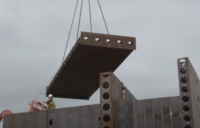The U.S. Justice Dept. has launched a multipronged effort to root out bid-rigging, price-fixing and other forms of collusion in construction and other sectors on local, state and federal government funded contracts, which it says undermines competition in procurement.
Officials say investigations will also cover projects funded by private owners.
Criminal conduct has become tougher to detect with online bidding platforms, but investigators now are exploring ways to use data analytics— such as on GSA procurement data—to identify potential collusion and gather evidence.
The department’s Antitrust Division now has a strike force that includes prosecutors from that office and 13 U.S. attorneys’ offices, as well as FBI investigators and those from inspectors general offices in four federal agencies.
They will jointly pursue procurement-related criminal probes and prosecutions in a pilot effort. “We will look at all forms of collusion affecting victims,” one official told ENR.
U.S. attorneys in central and eastern California, Colorado, Florida, Georgia, Illinois, Michigan, New York, Ohio, Pennsylvania, Texas, Virginia and Washington, D.C., are involved.
The division already has had inquiries about outreach training from state and local governments, officials said.
About one third of active division probes involve public procurement, focused on deterring criminal activity. Companies face fines up to $100 million if found guilty on an antitrust charge, with individuals facing 10-year jail terms and fines up to $1 million. Fraud conspiracy charges can bring stiffer sentences.
The division is training government officials to structure procurements to avoid illegal activity and spot fraud signs. It also is training contractors and industry associations to recognize conduct considered criminal, take appropriate steps and invest in up-front compliance programs.
Online bidding platforms have made detection tougher, but investigators now are exploring ways to use data analytics to identify signs of potential criminal collusion and gather evidence, says one department official, noting that the U.S. General Services Administration will comb procurement data for such evidence.
DOJ hopes a closer focus on construction will help identify leads to investigate and prosecute.
The antitrust division’s criminal enforcement arm has prosecuted industry bid-rig cases recently.
In July, DOJ said that Paul M. Camara Jr., president of an insulation contractor, pleaded guilty in U.S. District Court in Bridgeport, Conn., to rigging bids on insulation installation jobs at universities, hospitals and other public and private projects in Connecticut and elsewhere, the third conviction in an ongoing sector probe.
DOJ said conspirators discussed prices and agreed on bids that inflated customer costs by about 10%.
To conceal their actions, ongoing from 2011 until 2018, they executed bid-rigging and fraud schemes using burner phones.
“This plea is a warning to contractors engaged in bid rigging and fraud that they will be held accountable,” Assistant Attorney General Makan Delrahim said at the time.




